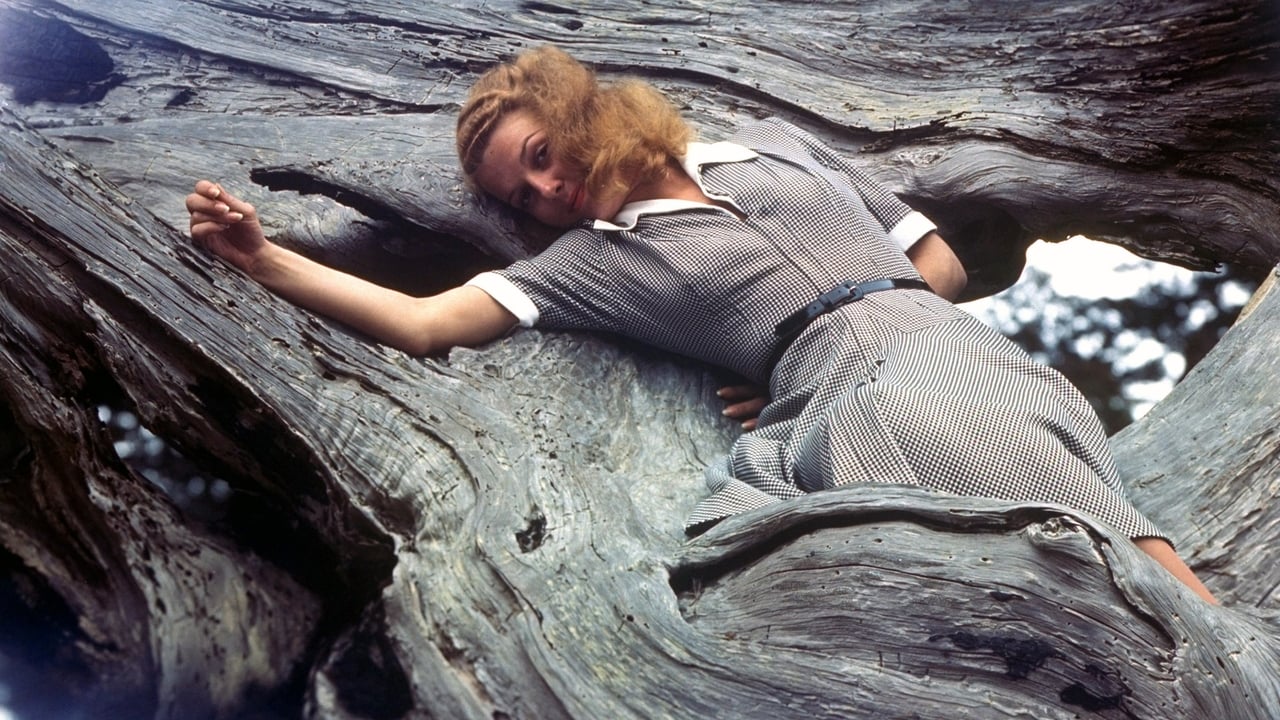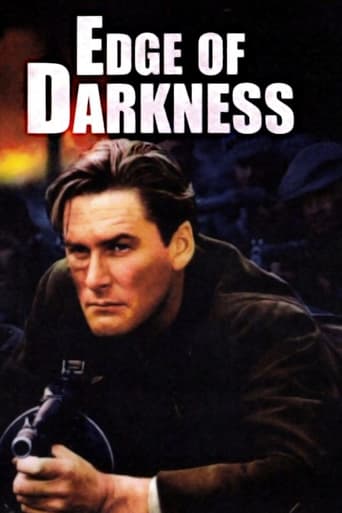ReaderKenka
Let's be realistic.
Beystiman
It's fun, it's light, [but] it has a hard time when its tries to get heavy.
Frances Chung
Through painfully honest and emotional moments, the movie becomes irresistibly relatable
Married Baby
Just intense enough to provide a much-needed diversion, just lightweight enough to make you forget about it soon after it’s over. It’s not exactly “good,” per se, but it does what it sets out to do in terms of putting us on edge, which makes it … successful?
tomsview
Made during the middle of WW2, "Edge of Darkness" tells how the Norwegian citizens of Trollness, led by a resistance fighter played by Errol Flynn, rose up and liberated themselves from their Nazi oppressors.Although the film is probably as close to real events as "Cowboys vs. Zombies", historical accuracy wasn't the number one priority of the filmmakers. The film was a contribution by Warners Bros to the Allied war effort, and is so stirring that if people didn't rush off to enlist as soon as they left the theatre then they would have at least bought a stack of war bonds. There is a lot of movie magic in the film. Location footage was combined with scenes shot on the sound stage with a great deal of miniature work thrown in. This mixture gives the film a somewhat mythical quality; we are drawn into the isolated, almost claustrophobic world of Trollness, where the battle, physical and ideological, is fought between the Norwegians and the Germans.These days we accept Errol Flynn as a far better actor than was probably acknowledged back then when his activities in the bedroom seemed to blur any appreciation of his talent. He underplays here and is very believable as is Ann Sheridan.However, Helmut Dantine stole the show as the commander of the German garrison. Dantine could 'master race' with the best of them. Hollywood had some very effective actors who specialised in playing Nazis, but Dantine could out-heel click, out-Heil and out-face slap any of them. Although Nazis of that era could never be portrayed sympathetically, Dantine created a complex character, seemingly on the verge of a breakdown.The most memorable sequence in the film is the uprising at the end. Much of the action is filmed with the same brilliant tracking shots director Lewis Milestone used in "All Quiet on the Western Front" especially as the Norwegians advance against the German machine guns or fight them hand-to-hand in the streets.There are many dramatic speeches in the film. A number of characters espouse ideas that probably weighed against the screenwriters a little later in the McCarthy era. After all, the biggest traitor in the film is also the major symbol of capitalism - the wealthy owner of the local cannery.The battle was also fought in the film's music. Franz Waxman counterpoints soaring renditions of Norway's national anthem and hymns with bursts of "Deutschland über alles" - all adding to the richness of the film.I can imagine this would have been an uplifting film to see during WW2. Even now it's hard not to get a lump in the throat as the Norwegians break into song in defiance of the Nazis. Corny to some maybe, but for me it's a classy piece of filmmaking from Hollywood's Golden Age.
oldblackandwhite
Edge Of Darkness is one of the most underrated movies by one of the most underrated directors, Lewis Milestone. This World War Two "propaganda" piece or morale builder rises far above its genre in the hands of the cinematic master best known for his magisterial World War One picture All Quiet On The Western Front. The story of a revolt brewing against Nazi occupiers by the people of a Norwegian fishing village, scripted by Robert Rossen, is reeled out in Milestone's fluid, sensuous cinematic style with spellbinding suspense from beginning to end. Sets are first rate, with the magic of Old Hollywood art transforming the California coast into a misty Scandinavian fjord.Leading man Errol Flynn turns in perhaps his best job of acting. His dashing image is completely lost in the role of a humble fisherman not entirely confident as the leader of the local Resistance movement. No dashing uniform here, just a pea coat and a plain merchant sailor's cap. And no mustache! Flynn and leading lady Ann Sheridan both turn in the solid, understated performances their roles called for, but it is a superb cast of supporting players that really shines in this one. One of the great charms of this memorable movie is the rich character development amongst the supporting parts. Walter Huston, as the town doctor trying to sit the fence, and Judith Anderson, as a Resistance worker hopelessly in love with a German soldier, are dominating as always. But the show is practically stolen by Roman Bohnen, as a henpecked, middle-aged store keeper with dreams of glory, and the ubiquitous Henry Brandon, as a suave SS officer who may not be all he seems. Helmut Dantine, a refugee Austrian anti-Nazi in real life, plays the German commandant with razor-edge ruthlessness. Likewise outstanding are Ruth Gordon as the doctor's sadly unbalanced wife, Charles Dingle as her Quissling brother, John Beal as her wavering Quissling son, and Nancy Coleman as the commandant's frightened Polish mistress. Monte Blue, Frank Wilcox, Art Bridge, and Morris Carnovsky add their always reliable presences. Thanks to consummate acting skill, Rossen's intelligent script, and Milestone's precise direction, you will come to know these characters as well as your neighbors by the shattering end of this two hour movie.Franz Waxman's florid score themed on Martin Luther's stirring hymn "A Mighty Fortress Is My God" with snatches from Wagner sweeps the action along to a rousing climax.Sid Hickox is credited for the sublime cinematography, but as I have stated elsewhere (see my review of The General Died At Dawn), Milestone's graphic statement was the same no matter who was behind the camera or in the editing room. Sweeping camera, silky smooth scene changes with creative dissolves, panning mise-en-scene were all the master's trademarks -- much imitated and highly influential on the film noir style that came to dominate pictures of all genres during the 1940's. Notice how at the beginning of the final scene in Edge of Darkness the flapping flag dissolves into a sheet of paper in a typewriter!Edge of Darkness is a classic of the war/intrigue genre and one of the great movies of all time. First rate Old Hollywood entertainment from the master Lewis Milestone.
deschreiber
This is one of those heart-stirring war movies about ordinary citizens brutalized by arrogant, violent invaders. Rising up against their oppressors, knowing that it will mean death for many, the common folk achieve moral victory in the end. Who can belittle a theme like that? There are moments where the courage and determination of the common heroes can evoke a tear or give you a lump in your throat, and the sense of triumph at the end is uplifting. Having acknowledged all that, it has to be pointed out for the sake of newcomers to the film that the film is also unabashed melodrama, in which everything is black and white with no greys, where everything is just a little too much--too much nobility and self-sacrifice on one side, too much cruelty and inhumanity on the other, too many fine speeches, too many tear-jerking moments, too many scenes with the sole purpose of playing on the viewer's heartstrings. If you're prepared for the melodrama and not expecting anything too close to the complex reality of actual people and actual situations, you can enjoy this movie.
richard-1787
During World War II Hollywood, as its contribution to the war effort, made a lot of movies designed to convince Americans to support the war. Some of them can only be excused by the need to convince Americans to win the war at all costs. Others, like Casablanca, will be ranked as among the greatest movies ever made as long as people watch movies.The Edge of Darkness isn't on a level with Casablanca, but it's not far short of that. The director, Lewis Milestone, had made such great movies as All Quiet on the Western Front and The Front Page. He directs this movie, blessed with a largely great script, with a brilliance and power that is second to none. By the end, even the most convinced pacifist will be clamoring to kill as many Nazis as possible. Even Casablanca and Mrs. Miniver do not stir up a hatred of the Germans the way this does. Like Leni Riefenstals' The Triumph of the Will, this movie shows how passions and hatred can be evoked outside all reason - a very frightening thought.But everything in this movie is good. Errol Flynn has to act - there is no swinging from vines here - and shows that indeed he can, aided by his magnificent voice. Ann Sheridan, often dismissed as a very attractive pin-up girl, holds her own in the woman's acting division against such powerhouses as Judith Anderson and Ruth Gordon, both of whom turn in masterful performances. Walter Huston is his usual impressive self, as are all sorts of "character actors" who, given real characters to develop here, show just why they are great actors: Morris Carnovsky, Charles Dingle (who has given so many great performances, as in The Little Foxes), even Virginia Christine, who later went on to be Mrs Olson for the Folger Coffee commercials. Because this script is so well written, even the "little people" become outstanding individuals, developed to their fullest by great performers.It's fairly predictable until the scene when the local schoolteacher is almost killed by the Nazis in public. From the revolt that that triggers through the end of the movie the movie rises to a level of mastery that can't be beat. This movie must have had an overwhelming effect on Americans during the war. Even today, it takes a hold of you and controls your thoughts and feelings no matter how hard you try to resist.So then. One part Cascablanca, one part Mrs. Miniver, one part The Triumph of the Will, and a lot of just great direction and acting. If you haven't see it, make sure that you do. And make sure you have lots of Kleenex.

